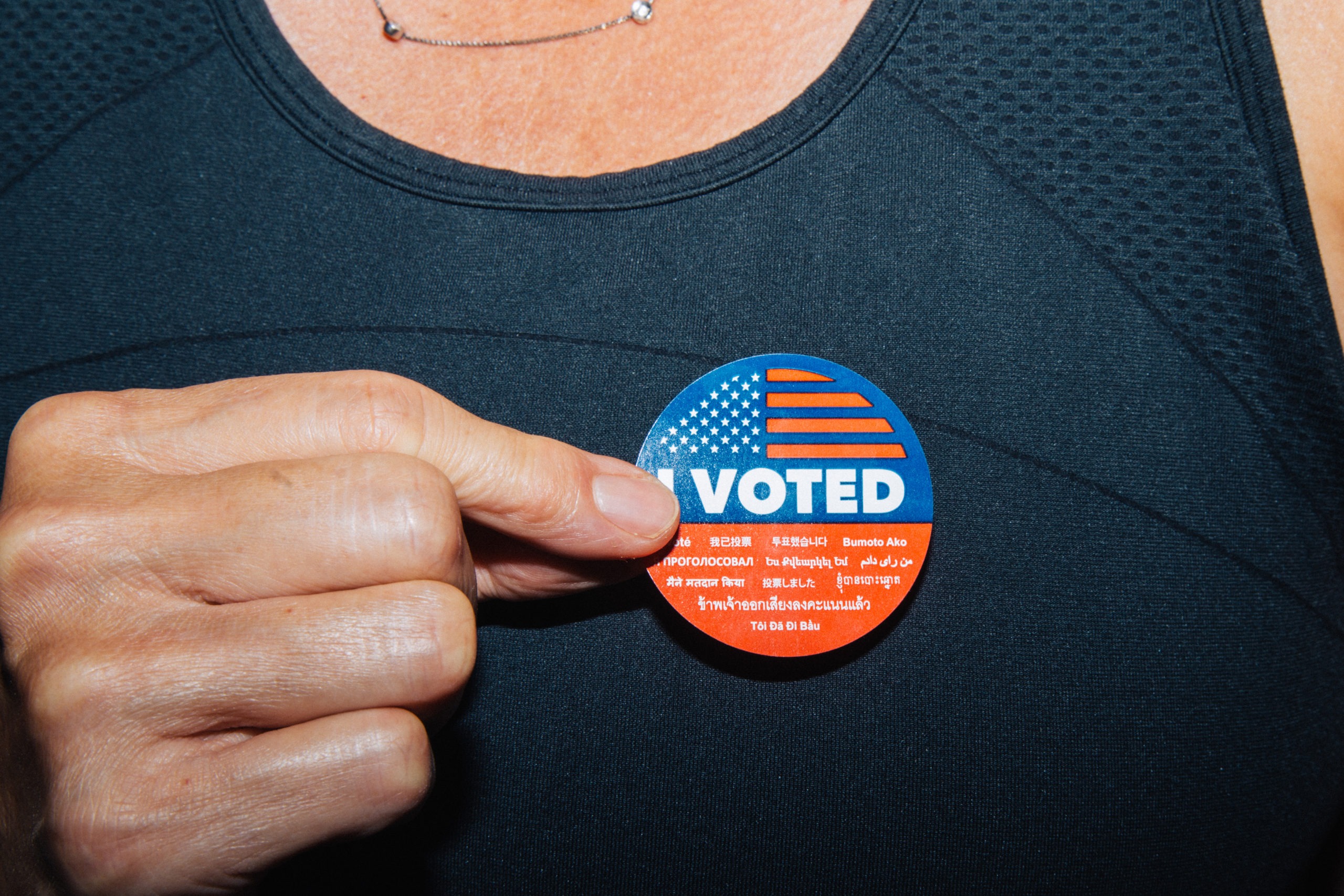Living room campaigners adapt to a pandemic election

Photo: Clara Mokri (’21)
OCTOBER 28, 2020
Betsy Guthrie used to lead campaign phone bank trainings in loud, crowded houses sprinkled with snacks and buzzing with energy. Not this year. Ms. Guthrie is alone in the guest bedroom of her home in Marin County, shouting into a computer while fiddling with screen share.

“I don’t know how we would do this right now without the technology,” said Ms. Guthrie, a former teacher and a volunteer campaigner. Over the last three months, she has led three virtual phone banks a week for the Marin chapter of the progressive grassroots organization Indivisible. Her small community team, a core group of about 50 volunteers, has made over 155,000 calls to voters since the start of September. Lately, they’ve been calling voters in the battleground state of North Carolina to advocate for Democratic candidates up and down the ballot.
With much of the usual on-the-ground campaign efforts made unsafe by the pandemic, volunteers from both parties have become even more dependent on the phone. New online dialers have made traditional, manual phone banking obsolete, allowing volunteers to make more calls, faster. At least among Democrats, volunteers from California are driving that work nationwide. One progressive group, Swing Left, estimates that about 25 percent of the millions of calls its volunteers have made across the nation this election cycle came from California.
In a pandemic, many phone banks across the country work like this: Volunteers join a group Zoom meeting where an experienced volunteer or campaign worker instructs them to log in to a software platform to start making calls. The platform simultaneously dials multiple numbers, sourced from a campaign’s database of voter registration information. When someone picks up, the volunteer hears a beep.
“It means someone has answered the phone,” Ms. Guthrie said. She tells her volunteers to start talking immediately, to make the call sound more natural to the person who answered.
Next, the platform prompts the volunteer to plug in information about the person they’re talking to. If a voter says they are absolutely sure they’re voting for Donald Trump that gets logged. If they simply hang up that gets entered too.
According to Susan Morgan, the founder of Ms. Guthrie’s Indivisible chapter, hang ups happen less often this year than in the past. “Everyone craves more social interaction,” Ms. Morgan said. Because of the pandemic, “there’s just more receptivity to having that human connection on the phone.”
Volunteers leave the Zoom meeting on mute in the background while they make calls. If they need help, the organizer is there to troubleshoot. “Most of the volunteers I work with in Marin are around 60 years old,” Ms. Guthrie said, and some are less comfortable with the new technologies.
Many progressive organizations and the Democratic National Committee are making calls with ThruTalk, a software made by Oakland-based company GetThru, which launched in September of 2016. Daniel Souweine, the founder of GetThru, said that until recently old-fashioned phone-banking had moved out of the campaign spotlight. “We live in a society where phone calls seem almost passé,” he explained. Social media and texting seemed more of the moment. “But, especially in a pandemic, we realize those things lack something in terms of the real personal connection.”
“In previous cycles, you saw people phone banking in brick and mortar locations,” said Krista Pittman, California State Director at the Republican National Committee. “You’d see cords running all over the floor.” The RNC now uses a platform called Trump Talk, which functions like ThruTalk.
For Mrs. Pittman, the virtual format has expanded bandwidth. “We are able to recruit out of state, out of district, people who really want to play a part in flipping California races.”
Morgan Kimbarow, president of the San Diego Young Republicans, said that Trump Talk allows him to make calls at his convenience, from anywhere. He’s called voters in battleground states from his desk, his couch, and even while driving. “It feels very good to understand that you’ve made a dent in the political process,” he said.
Not every campaign has such advanced technology. For the state legislative races that progressive organization Sister District focuses on, volunteer Katherine Tynan dials manually with her cellphone. “Most of the state level stuff, they don’t have a large enough budget to buy into the autodialers,” she said.
Even virtually, Ms. Guthrie still feels a sense of volunteer camaraderie. At the end of each phone bank session, her volunteer group meets back on Zoom to debrief.
“I feel like I was really bitchy today and I just want to apologize,” Ms. Guthrie tells the group on a Sunday evening. As the election nears, tensions can run high. “It takes a village,” a voice assures her from the Zoom square.
After two hours of phone calls – calls that managed to reach roughly 800 actual voters in North Carolina – it is 5:00 p.m. on the West Coast. Ms. Guthrie logs off Zoom and makes herself a drink, decompressing before her next phone bank three days away.
Noah Baustin contributed reporting to this story.
Sofie Kodner and Noah Baustin are reporters at UC Berkeley’s Graduate School of Journalism.



